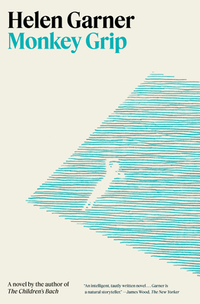Monkey Grip by Helen Garner
 Friday, February 23, 2024 at 5:39AM
Friday, February 23, 2024 at 5:39AM 
First published in Australia in 1977; published by Pantheon on February 20, 2024
Monkey Grip is regarded as a classic of Australian literature, the first novel of one of the nation’s most celebrated writers. I wouldn't say it has aged well.
The novel is narrated by Nora, a woman in her early thirties living in Melbourne in 1975. Nora has a daughter named Gracie, the product of her failed marriage, although Gracie plays a relatively small role in the novel (and seemingly in Nora’s life).
Nora is in love with a junky named Javo. Nora spends half the novel telling the reader how much she loves Javo. She spends the other half telling the reader how miserable Javo makes her. Love and misery often share the same paragraph.
Nora is a mess. She regularly does coke and acid. While she manages to hold a job and raise a daughter (activities that seem to happen in the background of her life), she’s hardly in a position to complain that Javo spends his dole money on heroin. She sleeps with other men but is jealous when other women show an interest in Javo. She breaks up with Javo and then pines for him. She takes him back and returns to a state of misery. Repeat and repeat and repeat.
One might think that heroin is the problem since Javo is by all accounts a likeable dude, but when Javo gets cleaned up for a period of time, Nora is even more upset with him because he doesn’t seem to need her as much as he does when he’s high. In fact, he starts sleeping with a different woman when he’s straight, which is definitely a bad sign for his relationship with Nora. Nora nevertheless seems to be his favorite partner, perhaps because she keeps her eyes open when they screw.
Javo shags an impressive number of women for an addict who steals from his friends when his money runs out. Nora seems willing to sleep with anyone who asks but she has fewer partners than Javo. Sometimes Gerald joins Nora in bed but, for ambiguous reasons, he won’t always shag her. This is not great for Nora’s self-esteem since he seems to have a sexual interest in other women.
Nora’s life is made messier by the domestic drama that surrounds it. A reader might need a spread sheet to keep track of who is shagging whom in this domestic drama. Nora’s friend Rita seems interested in messing around with Javo, and then with the boyfriend of Nora’s friend Angela. This gives Nora and Angela an excuse to be catty about Rita’s overall sluttiness. Rita’s regular boyfriend is Nick but he’s another junky. At some point I stopped trying to keep track of the characters, most of whom exist only to give main characters something to gossip about.
The men in the novel are all losers but what does that say about the women who desire them? That might be the question that animates Monkey Grip. Nora becomes “dried out with loneliness” if a guy isn’t making her wet. Nora clearly uses men for sex (which isn’t a problem since they are happy to be used), but she’s a bit of a hypocrite when she accuses Javo of using her for sex. She only seems to be happy when he’s shagging her, so what’s the problem?
Nora at least has some self-awareness. She understands her insecurities even if she does little to conquer them. She wonders “why I always need a man to be concerned with, whether well or ill.” She wonders why she is afraid to be alone. She wonders why she comforts herself by picking out the least attractive characteristics of women who share an interest in the men in her life. She wonders why she can’t screw the same person in a committed relationship for more than a couple of years before losing interest in the sex. She realizes that she is not a kind person and that her personality makes her unhappy. “So change yourself,” a reader might think, but Nora — like most people — is better at identifying faults than addressing them.
Perhaps my reaction to Monkey Grip is too judgmental. After all, Nora is living in a different age and culture than twenty-first century America. She rarely tells men what she’s really feeling because she’s been conditioned to obey “some unwritten law, blood-deep” that prevents women from being honest when they feel emotional pain. Nora has embraced the sexual revolution but notions of gender equality that are central to modern feminism have not empowered her. That’s probably not her fault as she likely hasn’t been exposed to those ideas.
So maybe I’m being too harsh, but I was more annoyed by Nora than sympathetic to her plight. Perhaps I should have been enlightened by Nora’s reaction to the emotional burden of loving a man who makes her life so difficult, but I just wanted her to come to her senses. Monkey Grip has interesting moments, but I might have enjoyed it for its shock value in 1977. Today, it feels dated.
RECOMMENDED WITH RESERVATIONS
Reader Comments